Over the past 20 or so years, millions of dollars (pounds, Yen and Euros) have been invested by governments, charities and professional bodies in an attempt to break down misunderstandings about science within the wider public. Much of it has been done in vain and the successes have been small. When you look at actual data, it makes for some quite shocking reading; the general ‘educated’ public remain frighteningly misinformed about the fundamentals of science…
So is anyone to blame and what the Higgs can we do about it?
Science (mis) understanding in the public
Public surveys show that nearly half of all Europeans and Americans don’t know how long it takes for the Earth to go around the sun! (It’s one year, in case you weren’t sure). Most people don’t realise that electrons are smaller than atoms, and the majority of Americans think that humans and dinosaurs lived at the same time.
Despite the earnest efforts of common-sense advocates like Ben Goldacre, the popularity of pseudoscientific thinking continues to rise thanks to celebrity endorsements for detox diets, holographic bracelets and homoeopathic ‘alternatives’ to malaria treatments.All of them are bunk, but the masses chose to lap them up rather than check out the facts; and with the re-emergence of measles after the MMR vaccine myth means it’s more than people’s wallets that are at stake.
In a world where facts and information are more accessible than ever before, Observer reporter Tim Adams is on the money when he says we are entering a “new age of ignorance”.
Our Survey Says: Science Sucks
So just why don’t people find science interesting?
Witnessing the ‘penny dropping’ moments of revelation when students or friends start to understand the significance and meaning of something ‘scientific’ is one of life’s most satisfying experiences. Why can’t other’s appreciate science for what it is? It’s an elegant and often beautiful means of understanding the complexities of life - it opens a door of understanding onto this amazing world around us.
Is anyone to blame?
Some point the finger of blame for widespread scientific ‘illiteracy’ at the media, others at teachers, textbook writers and policy-makers. Each undoubtedly has a part to play, as does the scientific community. The disconnect between the scientific community and the lay person is undeniable. Ask yourself: Just how many people would pick up and read a popular science magazine who have no previous science background or University education? How many people without a science background actually read science blogs?
I wouldn’t pick a fight with a science periodical or a science blog - on the most part I enjoy reading both and they perform an invaluable service. Yet the science writers have been heavily criticised for being an ‘echo chamber‘ for those of a certain demographic and education. Perhaps because of this fear, something inside has been nagging away at me: Could science writers do more to engage and excite the lay reader with this thing we love so much?
Frankly, I’m sick of science being synonymous with ‘geeks’ in lab coats with bad hair (although I confess my hair isn’t looking too good today).
“More of what currently goes on backstage in the scientific community has to become more visible if people are going to get a clearer idea of the potential and limitations of the new wonders science is proclaiming.”
Steve Miller, writing in his article ‘Public Understanding of Science at the Crossroads’
An attempt to do something positive…
In a desperate bid to do something to bridge this cavernous gap between ‘scientists’ and the rest of the world, me (and a couple of willing friends) have decided try to do a little something to redress the balance.
Today, we have launched what we are calling a ‘science lifestyle’ magazine - ‘Guru‘. Eschewing ‘science’ in the title (lot’s of people I know get put off by that word alone), and designed it to appeal to a general reader we have made it free to download. Designed for iPads, Smartphones and other such new and emerging technologies - the vision is to make science interesting and accessible to the 21st Century Jo(e) Bloggs.There’s so many brilliant communicators on the internet, and so we’ve made It a crowd-sourced project, meaning science writers/bloggers and anyone else with talents to share to get involved. Please take a gander. We are quite proud of it and hope you enjoy it and share the vision. We would like it to give both budding and established writers an opportunity to reach out to a wider audience - and become a ‘Guru’ (no professional qualifications required)!
.
Thanks for reading - your comments and feedback are warmly welcomed!
.
References:
The interested reader would be recommended to review some of the findings of within Chapter 7 of Science and Technology: Public Attitudes and Understanding by the NSB
Miller, S. (2001). Public Understanding of Science at the Crossroads Public Understanding of Science, 10 (1), 115-120 DOI: 10.1088/0963-6625/10/1/308
A presentation by R Hake of Indiana University entitled The General Population’s Ignorance of Science-Related Societal Issues: A Challenge for the University makes some worthwhile points.
Takeshita, Itaru., INOUE, Ken. and Todayama, Kazuhisa. “A preliminary survey toward a better science communication of neurosciences” Paper presented at the annual meeting of the 4S Annual Meeting - Abstract and Session Submissions, Komaba I Campus, University of Tokyo, Tokyo, Japan, Aug 25, 2010 . 2011-05-27 <http://www.allacademic.com/meta/p421657_index.html>


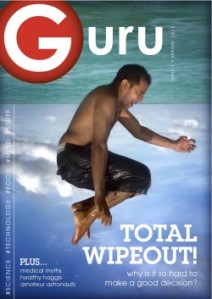

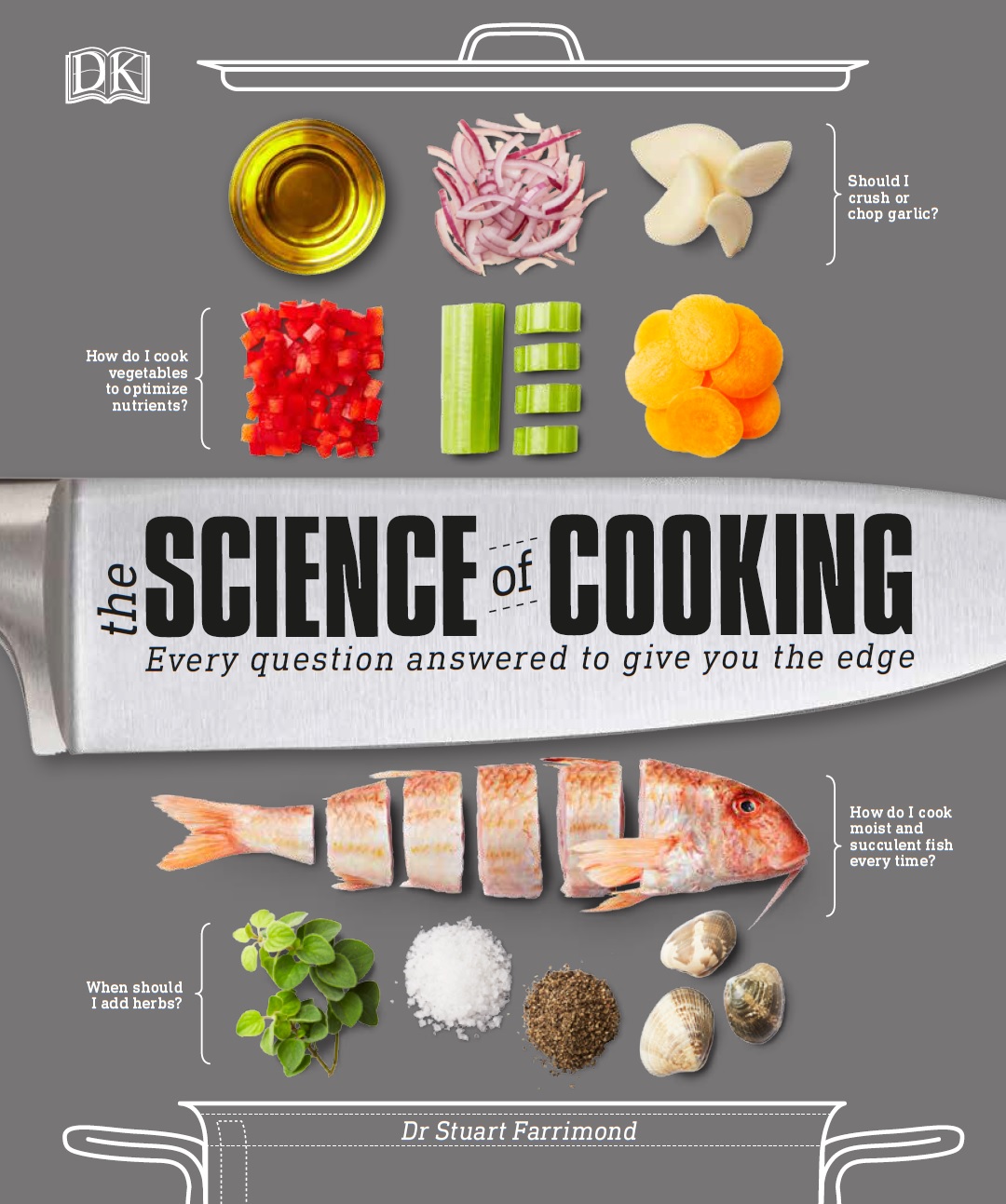



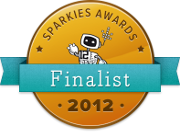
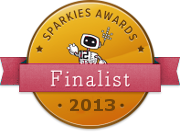
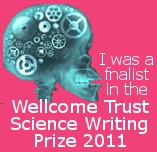


Hi Stu,
In your lucid and brilliant style, you have (again) hit the nail on the head! In addressing the problem with Guru I hope that barriers will be broken and your rise to international fame meteoric!
Here’s to your success!
Guy.
Posted by Guy | June 1, 2011, 9:08 amHi Guy!
Thanks for the encouragement. Here’s hoping that Guru can do something good. International Fame? Not too sure about that one… 🙂
Posted by Stuart Farrimond | June 1, 2011, 10:08 amGuru looks really fascinating. Good luck and I will course spread this good news around.
Reader from Taiwan.
Posted by Portnoy Zheng | June 1, 2011, 11:46 amThanks Portnoy!
Posted by Stuart Farrimond | June 1, 2011, 12:23 pmAs a (very recently former) science blogger, I’ve heard the refrain about the disconnect between the scientific community and the public for a long time and I find that it’s very true when talking about the interactions potential future scientists have with their first science classes.
Why do so many people describe science as stuffy, pretentious, and boring? Because to them, science is being locked in a classroom for 45 to 55 minutes a day, being forced to memroize terminology adn regurgitate it on a test. You can talk about the most exciting things but when it all comes down to humdrum memorize-regurgitate-solve-a-formula routine, even discussions about potential alien life will bore an astrobiologist to sleep.
Now when you give kids an experiment and have them find out what you’re trying to teach them through experimentation, or playing around, science becomes fun. Want more people in computer science? Let kids play with some basic robots like Lego Mindstorms so they get the idea that hey, I can press a few buttons and make cool stuff happen. It all comes down to showing why science is neat rather than talking about how neat it is.
So while I do appreciate the idea behind Guru and think you might get some interested readers, if you really want to get more people interested in science and thinking scientifically, your best target would be school boards and school administrators who refuse to spend the time and money required on a quality scientific education rather than merely hassle teachers to get kids to pass enough standardized tests so they can keep their funding.
Posted by Greg Fish | June 1, 2011, 2:24 pmThanks so much for your comment Greg,
Couldn’t agree with you more: Many assessment methods are weirisome and I know only too well the pressures to get students through their assessments. Within my capacities as a lecturer in a college for students aged 16+ I continually endeavour to make the teaching more exciting and interactive.
I don’t have children and have little experience with younger learners, so don’t feel in a position to comment about what teaching is like in schools at present. I do know that you aren’t a lone voice and many many people think the same way you do.
You could well be right that the root of the problem is with education in the early years and I would whole-heartedly support any initiative to make science more interesting and ‘experiential’ for learners across the years.
Posted by Stuart Farrimond | June 1, 2011, 2:42 pmI like the idea, but have to wonder: do you have any plan for how to get the magazine to that audience outside the “already interested in science” category, which you’re arguing science blogs don’t reach?
Posted by Aurora | June 1, 2011, 4:30 pmThanks for the comment 🙂 A great question!
Well… Hopefully word of mouth (and email, twitter, Facebook, etc) with people telling their ‘non-scientist’ friends will go some way toward ‘getting the word out’.
We also have a rather nice ‘media guru’ (a professional PR man) who loves the Guru concept he’s been working hard to try to raise the profile of Guru through conventional (i.e. news agencies, etc) and less conventional (e.g. social networking) means.
It’s clearly going to take some time, and more than a pilot issue before we properly reach the target audience. But we (and judging by the responses so far, lots of other people) really think this is an idea that has some legs. Getting science-lovers behind the project seems a good place to start - because without support from the science community and some talented contributors, I don’t imagine Guru will get too far…
So far, we’ve been really spurred on by the encouragement and offers of support that people have already shown for this project.
(so, thank you all!)
Posted by Stuart Farrimond | June 1, 2011, 7:26 pmHi,
I teach and research this stuff for a living, and hope you’ll take this feedback in the constructive and sympathetic way I mean it in. It is in no way a criticism of your magazine (good luck by the way!) just the points put forward in this post.
“Our survey says science sucks” Really? Um, well, er, no. No it doesn’t. Or it at least, it depends. Try this, for a start: 81% of 14-16 yr olds in the UK said they were amazed by the achievements of science, and 65% feel that it is important to know about science in their daily lives (source). Or there’s this study, or the larger one the line about 14-16 yr olds comes from.
Some of this is a matter of ‘glass half empty/ full’ analysis. How you choose to read the various public surveys is up to you. Some people see them and say ‘yay’, some think anything less than 100% is too low. I’d also say I find these sorts of surveys a bit blunt (people and their interactions with each other being complex, as is an idea of ‘science’ compared to specific issues like GMOs, nuclear power etc). Still, they are the best studies we have, and based on years of research and thought into methodologies. This paper is really good (you’ve got Steve Miller’s crossroads paper on your reading list, he co-authored this one too). In particular, it notes some key differences in approach from the EU and UK models and those used by the NSF (which you ref in your list first).
If you want a good intro to issues of science and public trust, the recent BIS report on that very issue is probably the best place to start. I can also recommend this post on the Guardian Science blog from Jenny Rohn, where she works through her own experiences of being a scientist who thinks, from her own experience, that the public distrust science, only to find the picture is a lot more complex/ positive if you read up on research that’s taken a broader view.
The other big question is whether it matters if the public know that much science (liking and knowing being different things). This is a bit of a rant I had about the topic last year. The links at the end might be useful. Though, as I say there, they are all a bit old. It is because it is an old argument.
Your list of links at the bottom is ok (ish) but the really interested reader might be better off with this bibliography I prepared a few months back (this post might be helpful too, it’s a version of an intro lecture I gave on the topic recently).
Posted by alice | June 2, 2011, 12:13 amHi Alice!
Thanks for the comment. All the extra info and reading is very much appreciated 🙂
The stats I used came from a 2005 survey by OCR. Although I haven’t been able to locate the original paper, it is reported in the Guardian here: http://www.guardian.co.uk/science/2005/jun/17/schools.education
I’ve enjoyed reading through the links you have provided – some of the surveys I hadn’t seen.
One thing I did note from reading through the papers & surveys you cite is that younger children enjoy science; but for older teenagers the results are much less positive.
Any insights on why you think this might be?
Posted by Stuart Farrimond | June 3, 2011, 10:00 amThe younger/older thing is interesting. It’s been a noticeable problem for a while too - it’s one of the key reasons Science Year was set up in 2001/2 (ended up running till 2003, then sticking around as a website as ‘Planet Science’ now in rather different guise).
If I’m honest, it’s been a while since I checked what the research was on this - people at KCL, Leeds, York or the IoE (especially KCL, I think) might have a better idea than me. From what I can tell, it seems to be mixed in with general problems of getting older, shifting to secondary school, but also the rather tight restrictions imposed by examinations. Some people have also argued that we give kids false expectations with the ‘science is soooo cool’ stuff early on, so they get disillusioned, and that secondary school science teachers aren’t v good at listening. There isn’t, to the best of my knowledge, a huge amount of data on any of this though. It’s something I think should be researched more.
Posted by Alice | June 3, 2011, 4:09 pmHi Alice,
Yes absolutely - Greg made similar comments about education(above).
Git me thinking and i just did a quick Google and found this: http://www.netnewspublisher.com/time-warner-cable-campaign-explores-global-teen-attitudes-toward-math-and-science/
Could be quite interesting to see things from a global perspective as well…
Posted by Stuart Farrimond | June 3, 2011, 10:11 pmIf the magazine’s contents prove to be both educational and fun to read, then I’m sure everyone will start talking about it on Twitter, Facebook, and of course, word of mouth.
This is exactly what happened with a mexican project hosted by a group of students who call themselves “BullyMagnets”, it focuses on demonstrating that History can be an interesting topic and not just a bunch of boring dates and names that students are forced to memorize. It started with a few videos on YouTube and a small site, and after just a few months, they have over 2,000 fans in their Facebook page and have been invited by museums and universities to show their work in real-life events.
In fact, I saw a lot of similarities between their first video (Titled “Why do you hate History so much?”) and this blog post.
Anyways, sorry if I looked like a bad advertiser for another project. My main point was to assure you that projects like this have the potential to become quite popular, even to an audience that has never been interested on science before. I’m very interested in this one, and although I still don’t have a degree in any scientific discipline (currently studying a career in Mechatronics) I’d be more than glad to help, and of course, spread the word.
Posted by Vexelius | June 2, 2011, 1:37 amHi Vexelius!
Thanks for the info: I checked out BullyMagnets - and it is seems to be a very interesting concept. Videos are such a powerful medium (although my Spanish isn’t good - so it was a bit lost on me) and it’s encouraging to see people who clearly love their subject ‘breaking out of the mold’ and trying something new and engaging a new audience.
Thanks for the encouragement 🙂
Posted by Stuart Farrimond | June 2, 2011, 8:04 amIn general, the public is not interested in a scientific discussion unless it seems exciting or life threatening. As with all good story-tellers, you only have 5 seconds in your ‘opening remarks’ to catch the publics attention. There are a thousand issues the public is deeply concerned about - and science has the answers to many of those issues - but, sadly, the public views scientists as a dis-united rabble, compromised by money and corrupt sponsors. Until we have a “World Science Academy” that is self-funded (not funded by ‘Big Oil’ or ‘Sandia’) (like Australias CSIRO), the public will never take us seriously. Money has always been a great destroyer! - even of scientific credibility!
Posted by Dr. Max Ward | June 2, 2011, 8:07 amThanks for commenting Dr Ward,
You raise some pretty good points.
I think there are lots of corrupt and ‘bad apples’ within every area, field and walk of life.
I think it is similar to what happens in many religions, when it the extremists and the corrupt who attract the most publicity - and distort the public’s perception of what a given world view actually stands for.
Do you think that we can do anything to actually present science for what it is? I’d like to think that science (and the majority of scientists) is about honest people in the pursuit of truth and furthering understanding - or am I too idealistic and have my rose tinted glasses on?
Posted by Stuart Farrimond | June 2, 2011, 8:26 pmThose Scientists who have the planets welfare at heart struggle in a sea of public apathy, government corruption and direct opposition from powerful lobby groups.
Exactly the same seemingly hopeless situation faced by the few voices for democracy in Egypt recently.
Our solution is the same as theirs..
1. Organize like minds into a ‘caucus’ or steering committee.
2. Choose ONE cause of public angst to focus the crowd. (President Mubarak)
3. As Proximo said to ‘The Gladiator’ “You must win the Crowd” - Utilize social media to the full.
4. Be prepared for some personal sacrifice.
5. Be deadly careful your ‘caucus’ doesn’t also get corrupted by power & money.
Sadly, most Scientists will balk at these ‘Mein Kampf’ ideas.. The Vs20 Group (Scientists, Authors & Academics) tried to start a political party (to win the crowd) - and 50% of their ‘fellows’ quit.
Posted by Dr. Max Ward | June 3, 2011, 3:44 amInteresting idea.
Who do you think public angst should be focused against? (Point 2)
Posted by Stuart Farrimond | June 3, 2011, 10:13 pmWith “One Point”, I agree with Brians comments above that the public would like to see many of their pet peeves covered. I was trying to draw a parallel with the SOCIAL MEDIA campaign against Mubarak in Egypt. They had a thousand points of ‘angst’ to campaign against - but wisely chose one.
Brian, ref. the “politics = academic suicide”. I’ve shown the urgent requests on your site (Vs2020.com) for “Peer Review” to some of my associates who could help - but notice their fear of anything political!
Posted by Dr. Max Ward | June 4, 2011, 5:52 amDr.Max, your points seem to imply a “Scientists Political Party” - which is what we (Vs20 Group) are trying to achieve. It is NOT true that we have lost “50%” of our scientific membership! Our main public efforts (over the last 100 years) are directed at Youth and Business Mentoring, and none of us have left that endeavor. Many of our scientists will not support our political party because of the huge stigma attached to politics! They acknowledge there may be no other way, but fear they will be committing academic suicide by being involved!
We agree with all your points except No. 2 (one of Hitlers favorites) - The public is not so narrow minded - we have over 50 points of ‘angst’ on our site and many readers comment “exactly my thoughts” on the majority of those 50!
Posted by Brian Lorentzen | June 4, 2011, 4:43 amThanks so much for starting this project. Hopefully it will change some minds.
Posted by Sarah Scoles | June 3, 2011, 1:55 amThanks Sarah - me too 🙂
Posted by Stuart Farrimond | June 3, 2011, 10:01 amThe good news is that I’ve been reading articles and opinion pieces like this for twenty-five years. I wonder how much of it is well-intentioned people trying too hard to make science “cool.” Science is cool, but it’s also boring (it includes things that don’t get people excited). It’s fun, but it’s also difficult (challenging). Sometimes I see people trying to skirt the negatives a little too hard. At our local children’s museum, which is an awesome place, and they’ve got the right idea most of the time, they have an exhibit about math. They show common, every day things, like music, origami and cooking, and have little signs saying “Where’s the math?” and they explain how math can describe these things. What they don’t say is that the reason all these patterns “have math in them” is that math is a language for describing patterns, i.e. math is logical and flexible and describes all these everyday things. However, they never come right out and say “Math describes all these things because that’s what math is.” I’m sure they want the math to sneak up on people, but I think it would be better if they’d just call it like it is.
Posted by trashbird1240 | June 5, 2011, 10:37 pmThanks for the comment Trashbird 🙂
I wish I had a museum like that near me…
Posted by Stuart Farrimond | June 6, 2011, 10:23 amGood show Stu! Keep up the good works!!
Posted by Rob Owen | June 8, 2011, 10:39 pmThanks Rob, Much appreciated! Will do… 🙂
Posted by Stuart Farrimond | June 9, 2011, 3:58 pmI totally agree- especially about keeping the word ‘science’ out of the title of Guru. I had the same issues to face when relaunching Oxford University’s science magazine ‘Bang!’. We chose a bright, funky colour scheme filled with hand drawn art to make people feel more interested in the articles and less intimidated by the whole concept of science. I think that scientists often perpetuate the idea that science is a closed club, that somehow it *should* just be for the relatively few who have studied it beyond school. It’s about time science snobs were shown up!
Posted by Nicola K S Davis | June 28, 2011, 10:44 pmAmen to that! 🙂
Posted by Stuart Farrimond | June 29, 2011, 7:36 am